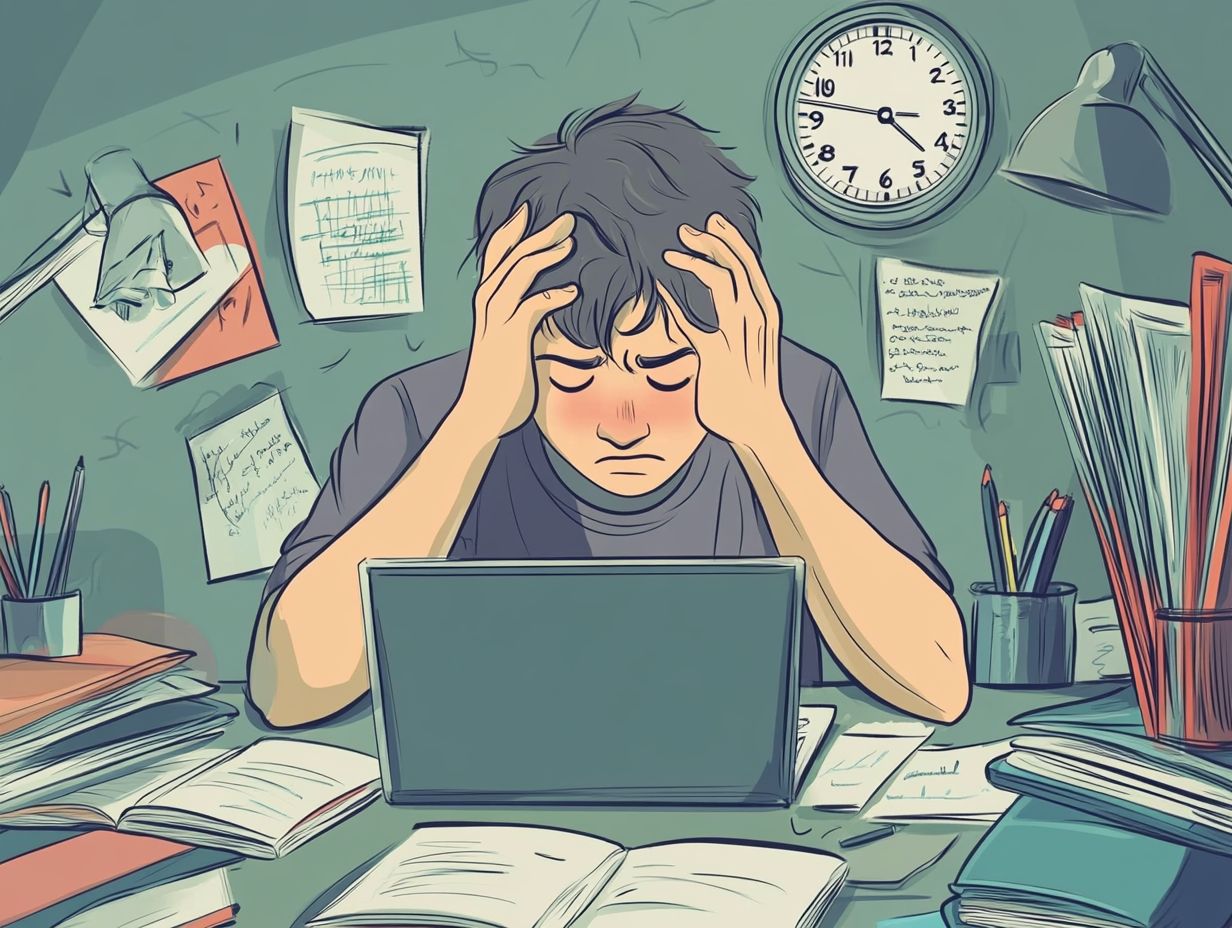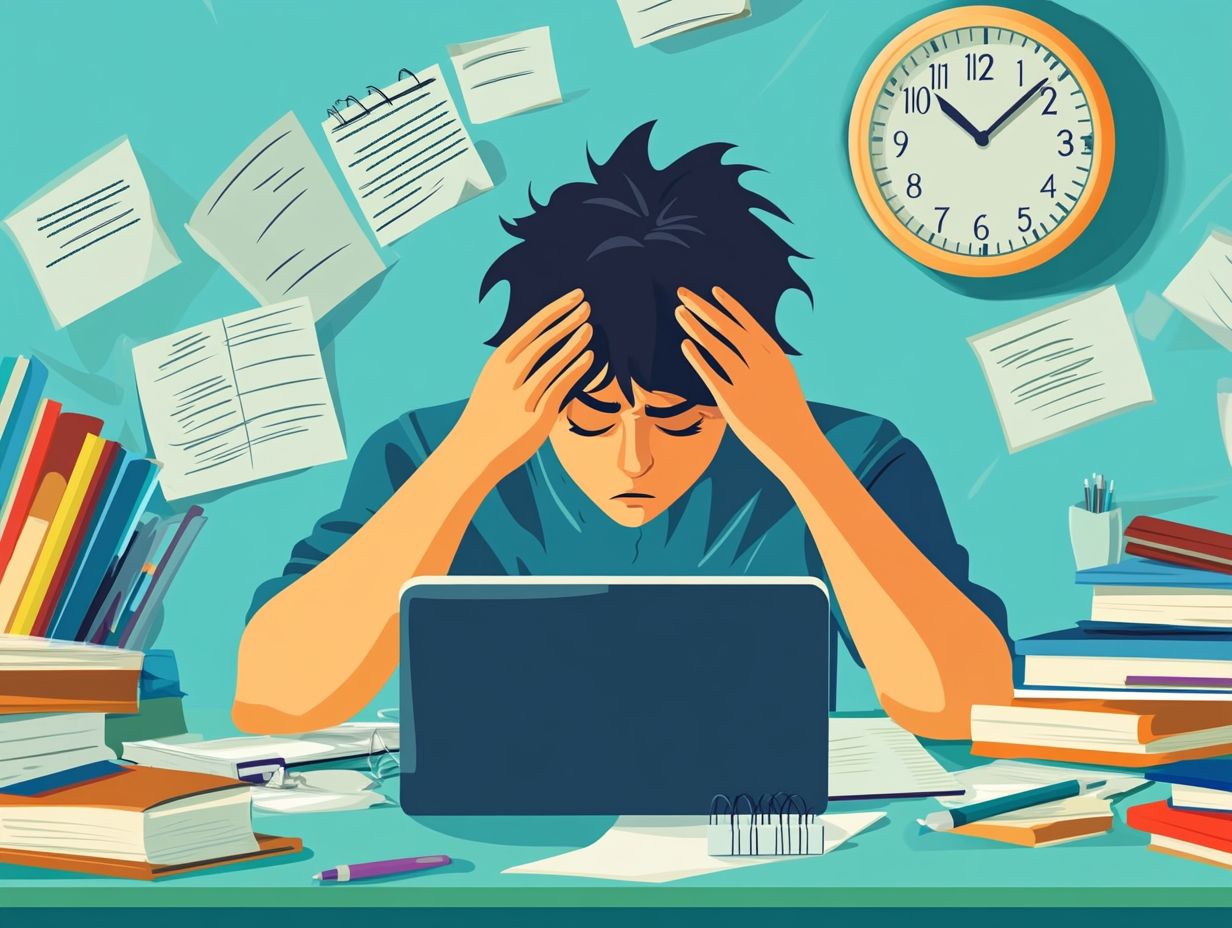what should i do if i feel unprepared for the test?
Test anxiety is a widespread experience that can profoundly affect your performance and confidence.
Recognizing its causes and symptoms is your first step in addressing this challenge. By employing effective study techniques and engaging in thorough mental and physical preparation, you can implement practical strategies that will leave you feeling more equipped.
This piece delves into relaxation and ways to think positively for managing anxiety, essential tips for maintaining calm on test day, and resources for seeking additional support.
Whether you re a student or a lifelong learner, you ll discover valuable insights to help you navigate test anxiety with confidence and ease.
Contents
- Key Takeaways:
- Understanding Test Anxiety
- How to Prepare Effectively for Your Test
- Managing Test Anxiety
- What to Do on Test Day
- Seeking Help and Support
- Frequently Asked Questions
- What should I do if I feel unprepared for the test?
- What are some steps I can take to prepare for a test if I feel unprepared?
- Is it too late to start studying if I feel unprepared for a test?
- What should I do if I don’t understand the material for the test?
- What are some ways to calm my nerves before a test if I feel unprepared?
- What should I do during the test if I feel unprepared?
Key Takeaways:

- Feeling unprepared for a test? Don’t panic! You’re not alone.
- Test anxiety is common and manageable.
- Prepare by studying and taking care of your mental health.
- Try relaxation techniques like deep breathing.
- Use positive self-talk to boost your confidence.
Understanding Test Anxiety
Test anxiety is a prevalent challenge that many students encounter. It manifests as feelings of fear and unease that can profoundly affect performance during exams.
This anxiety often arises from several sources: the pressure to meet educational aspirations, the dread of negative marking, and the intense stress that comes with last-minute cramming and preparation.
Gaining insight into the root causes and symptoms of test anxiety is essential for crafting effective strategies to manage it, ultimately enhancing your overall exam performance.
Causes and Symptoms
The causes of test anxiety can vary widely, from the weight of high expectations and fear of disappointing yourself or others to the cognitive overload that arises from ineffective study habits.
For many, especially students, these pressures can be intensified by previous experiences with exams that didn t go as planned. Just hearing about an important test can trigger a rush of memories those moments when forgetfulness struck at the worst possible time or when your mind went blank under pressure.
As exam day approaches, you may struggle with physical symptoms like sweating, a racing heart, or even nausea, compounding your distress. Cognitive symptoms often creep in too; you may find it hard to concentrate, second-guess your prepared answers, or fret about recalling everything you’ve studied.
This potent mix of emotional and physical responses can create an overwhelming barrier to performing your best.
How to Prepare Effectively for Your Test
Effective preparation for a test requires you to engage in strategic planning and implement study techniques that boost your learning and retention abilities. This ensures you can recall information even when the pressure is on.
Consider incorporating methods like spaced repetition, self-testing, and utilizing study materials such as flashcards to significantly enhance your memory and minimize anxiety.
By organizing your notes and mastering time management, you can develop a study schedule that not only alleviates stress but also elevates your overall productivity, setting you up for success on exam day.
Effective Study Techniques
Utilizing effective study techniques can significantly enhance your retention of information, making it essential for successful exam preparation.
One of the most beneficial methods you can adopt is active learning. Engage with the material through discussions, teach others, or apply concepts in real-life scenarios.
Techniques like spaced repetition, which schedule your review sessions over progressively increasing intervals, can help solidify your knowledge retention over time. Flashcards offer a dynamic way to test your immediate recall of key terms and concepts.
Incorporating practice tests allows you to familiarize yourself with various exam formats, including multiple-choice questions, ultimately boosting your confidence and performance on the actual test day.
Mental and Physical Preparation

Mental and physical preparation is crucial for exam success. It directly impacts your performance under pressure.
Try strategies like mindfulness meditation and deep breathing exercises. These can significantly reduce anxiety, leading to better focus and clarity.
Along with mental practices, eat a balanced diet rich in whole foods. Sleep well each night to boost how your brain works.
These efforts prepare both your body and mind for challenges. Together, they create a holistic approach, making you feel more confident and less stressed as you enter the exam room.
Managing Test Anxiety
Managing test anxiety is key to performing at your best. Balance relaxation techniques with smart thinking strategies.
Mindfulness practices help improve your concentration. They lighten the mental load during test preparation.
Deep breathing, visualization, and positive affirmations can reduce stress levels. These techniques enable you to approach your exams calmly and focused.
Relaxation Techniques
Relaxation techniques are effective tools for managing stress. They keep your mind clear during exams.
Incorporating methods like deep breathing and meditation into your routine can create your personal toolkit for academic pressures.
Deep breathing increases oxygen flow to your brain and slows your heart rate. This counters panic and helps you stay calm.
Meditation grounds you in the present moment. It reduces overwhelming thoughts about the future.
Visualization allows you to picture positive outcomes. This boosts your confidence as you prepare for tests.
These practices not only ease anxiety but also sharpen your focus. They equip you with the mental strength needed to excel when it matters most.
Cognitive Strategies
Cognitive strategies can enhance memory and help manage stress. Techniques like positive affirmations reshape your self-talk.
This promotes a mindset that focuses on your strengths rather than weaknesses. Visualization helps you mentally rehearse the exam situation, making it feel more familiar and less intimidating.
Reframing negative thoughts shifts your perspective. This turns challenges into growth opportunities.
These strategies build your confidence and create a calmer mindset. They are essential for navigating academic pressures and improving performance on test day.
What to Do on Test Day
On test day, employ strategies to stay calm and focused. Turn any anxiety into a productive force.
Mastering time management is crucial. Prepare your study materials in advance and maintain a positive mindset to set yourself up for success.
Tips for Staying Calm and Focused

Staying calm and focused on test day is crucial for your best performance. Here are several strategies you can implement to help you.
Take deep breaths before entering the exam room. This simple action can reduce anxiety and clear your mind.
Mindfulness practices can enhance your focus. They help you concentrate on the present instead of worrying about the future.
Positive affirmations are powerful allies. Repeat phrases like “I am prepared” to boost your confidence.
By embracing these strategies, you can maintain your composure throughout the test. This ultimately leads to improved performance and a more rewarding experience.
Seeking Help and Support
Seeking help and support is essential for managing test anxiety effectively. You can gain significantly by using the resources and support systems available to you.
Reach out to professors for guidance, use campus counseling services, or connect with peers who understand what you re going through.
Building a robust support network can dramatically ease exam stress.
Remember, asking for help is a strength, not a weakness. This is a vital step in conquering test anxiety.
Resources for Managing Test Anxiety
A wealth of resources is available to help you manage test anxiety effectively. Explore counseling services, support groups, and various online materials tailored to your needs.
By leveraging these tools, you can discover personalized strategies to tackle nerves and sharpen your focus during exams.
Many campuses offer mental health services, including one-on-one counseling and workshops to equip you with essential anxiety management techniques.
You ll find online articles outlining mindfulness exercises, serving as practical guides. Self-help books like “The Science of Overcoming Student Anxiety” can deepen your understanding of the stressors at play.
Engaging with these resources not only enhances your academic performance but also cultivates a healthier mindset for navigating student life.
Frequently Asked Questions
What should I do if I feel unprepared for the test?
If you feel unprepared for a test, take a deep breath and try not to panic. Panicking can cloud your thoughts and make it harder to focus and study effectively.
What are some steps I can take to prepare for a test if I feel unprepared?

If you feel unprepared, there are steps you can take to improve your chances of success. Review your notes and class materials, create a study schedule, and seek help from your teacher or a tutor.
Is it too late to start studying if I feel unprepared for a test?
No, it is never too late to start studying. Even with a short amount of time, you can review key concepts and practice with sample questions. Every bit of studying can help improve your performance.
What should I do if I don’t understand the material for the test?
If you don t understand the material, seek help from your teacher or a tutor. They can provide additional explanations or resources to help you grasp the content.
What are some ways to calm my nerves before a test if I feel unprepared?
If you feel unprepared, it’s normal to feel anxious. To calm your nerves, try deep breathing exercises, listen to calming music, or engage in a relaxing activity before the test. Additionally, consider following some strategies on what to do the week before the test to enhance your preparation.
Remember to stay hydrated and get a good night’s sleep.
What should I do during the test if I feel unprepared?
Stay calm and focused! Every second counts during your test. If you don’t know the answer to a question, move on. You can always return to it later.
Read all instructions carefully. Keep track of your time to ensure you finish the test.






